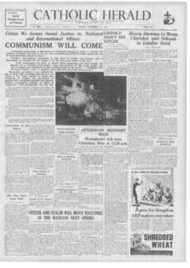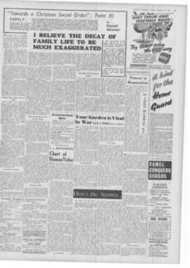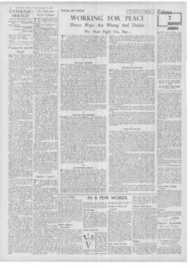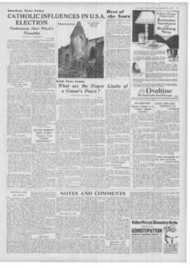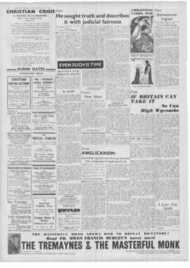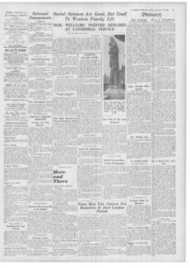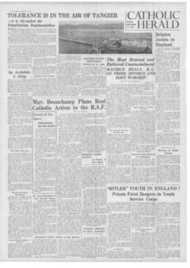Page 7, 13th December 1940
Page 7
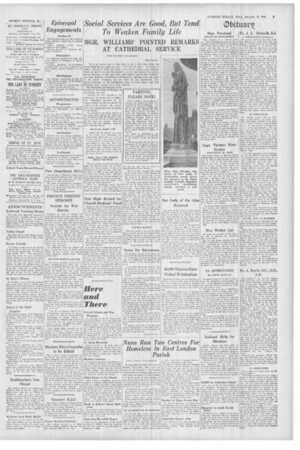
Report an error
Noticed an error on this page?If you've noticed an error in this article please click here to report it.
Tags
Share
Related articles
Obituary
More Test Results On Shroud To Come
Confusion Over Tests On Turin Shroud
The Slipper Chapel True S Rine The Vicar General Of Dort...
Swiss Greet St. Bernard's New Abbot
abittiar
Mgr. Freeland
PROVOST OF NORTIIAMFEON.
" Mgr. Freeland was a studious ridged with a great knowledge of scriptures and of languages, several of which he could speak, and he had a roost impressive manner in the pulpit," said the Rev. F. W. Lockyer, parish priest of High Wycombe, on learning of the death of the Provost of Northampton Diocese, which occurred on Saturday, December 7. " While still a boy, and an Anglican, he came under the influence of the late hr. Philip Fletcher while the latter was working at Brighton as a Minister of the Establishment, and it was through him that he made his own entry into the Church."
When the parents of John Freeland died, he was brought up under an uncle, and went to Valladolid for his studies for the priesthood. His health broke down, however, and he returned to Shefford, the Diocesan Seminary, being ordained in 1885. He built the church and presbytery at Ely, where he was put in charge in 1890, and was subsequently parish priest at Bedford from 1906 to 1924. During the ten following years he was rector at St. John's, Norwich, and became Canon Theologian in 1910.
Appointed Provost of Northampton Chapter in 1926, four years after he had become Vicar Genera), the Pope honoured him with the dignities of Domestic Prelate (1933), rind Protonotary Apostolic (1934). During the interregnum after the death of Bishop CaryEwes from 1932 to 1933, he acted as Vicar Capitular.
Following on his retirement from Norwich, the late Provost went to Thornton College as ChaPlain for a period of two years, retiring afterwards to The Sanctuary, Gunton, near Lowestoft. But at the outbreak of the war he moved to Shetford.
Mgr. Freeland was the author of several articles and tracts dealing chiefly with the history of the Primitive Church, and also of a volume of tales of early Christian life. Requiem Mass was celebrated at Bedford yesterday, followed by the funeral at Bedford Cemetery, the clergy of the diocese assisting in choir dress and rendering the plain-chant Mass,
Capt. Thomas More Eyston
DESCF.NDANT OF SAINT The Eyston family, of klendred House, Wantage, Beets, which are directly descended from St. Thomas More through the marriage of a son of the saint with Anne Crisaker, have been bereaved through the loss of Captain Thomas More Eyston, of the Royal Berkshire Regiment, who, previously posted missing, is now reported to have died of wounds on May 31. Born in 1902, the only son of John Joseph Eyston, J.P., who died in 1916, he was educated at Beaumont and New College, Oxford, he was Lord of the Manors of Arches, Abbey Manor, Catmore, and Appleford, and was appointed J.P. in 1932, becoming High Sheriff of Berks in 1916. Captaiti Eyston married, in 1930, lady Agnes Savilc, daughter of the 6th Earl of Mexborough, and leaves two sons and a daughter, twin with her brother Thomas More, who succeeds his father. The burial took place at the Seminary, Roulers, Belgium, and a Requiem was celebrated last Tuesday at St. Mary's, East Hendred.
The Eyston family have held their Berkshire property and manors in unbroken descent for over five centuries. Adjoining Hendred House is the ancient chapel or chantry of St. Amend, which has been the private chapel of the Eyston family since the reign of Henry VI. In the house are preserved St. Thomas More's drinking cup and St. John Fisher's walkingstaff.
Mrs. Walter Lee
The death has occurred of Mrs. Walter Lee, wife of Alderman Lee, Newcastle, after a long illness. Mrs. Lee was closely connected with the C.W.L. in Newcastle and during the last war took a prominent part in the founding of the soldiers' canteen, and was foremost worker in all Catholic movements in the City. She ably itesieted her husband when he was elected Sheriff in 1907 and during his terms of office as Lord Meyor of New--tette in 1920 and 1925, achieving a reputation as a hostess. For more than fifteen years she served on the Newcastle Board of Guardians and in 1921 she was elected to the Bench as a Magistrate,
AN APPRECIATION
FR. JOSEPH RYAN, Si.
An obituary notice on the late Fr. Joseph Ryan, S.J., appeared in these columns last week. We are pleased to be able to include this week the following appreciation which has just come to hand:— To those who knew him at Wimbledon, an obituary notice of Father Ryan which makes no mention of his activities in scouting, must necessarily seem incomplete. Fr. Ryan, first as scoutmaster and later as Group Scoutmaster of the 9th Wimbledon (Sacred Heart) Group, left his mark in two distinct directions In the boys themselves he contrived to impart a keenness to be of service to others, which must surely be operative, as they in their turn do the same, long after he and they are alike forgotten. The second service which Fr. Ryan gave was this: he made himself, and the group which he represented. genuinely liked in the local Scout Association in which the 9th Wimbledon was the only Catholic group. The value of this service it is impossible to over-estimate.
Fr. J. J. Driscoll, S.J.
A DISTINGUISHED MUSICIAN
We regret to announce the death of Fr. John Driscoll. S.J., which took place very suddenly at Farm Street on the afternoon ofFtiday, December 6. Ft. Driscoll, who was in his 76th year. had been a priest for forty-two years, of which forty had been spent at the Church of the Sacred Heart, Wimbledon.
Born in London on October 1, 1865, John Joseph Driscoll was sent at the age of fourteen to the Apostolic School at Turnout in Belgium, remaining there for just over a year, after which he went to Mount St. Mary's College, Spinichill. Entering the Society of Jesus at Roehamptort on September 7, 18e5, he completed the usual course of studies and was ordained priest at St. Bcuno's College on September 25, 1595. After two years' teaching at Stamford Hill and a year at Tronchicnnes in Belgium, he went to Wimbledon in 1901 and there het spent the rest of his priestly life.
A man of hnundless energy and a powerful preacher, he threw himself vigorously into the work of the parish, where his natural kindness endeared him to all who came within his sphere of activity. In addition to his ordinary work, he trained the church choir, in connection with which he founded a choir school. His choir soon became famous for the purity and high standard of its singing and attracted much attentiote Early in 1928, he took over the direction of the choir at Farm Street church and here also similar success attended his efforts.
AN APPRECIATION
Mr. Fernand Laloux, who as choirmaster at Farm Street, was closely associated with Father Driscoll in his work, write% of him :—" Wil,1 the death of Father S.J., the Church of England has lost one of its finest musicians. For over forty years, he directed the choir of the Sacred Heart Church, Wimbledon, and in 1928 in aedition. he took charge of the music of Farm Street Church. An expert on voice-production, he achieved marvellous results, often with indifferent material: his success in this respect was recognised by his London critics when his Wimbledon choir joined forces with the Westminster Cathedral Choir in the first performance of Vaughan Williams' Mass.
" A great exponent in choral technique, he was not afraid to apply its subtleties to polyphonic music, thus giving life to many pages which otherwise might have been considered clever but dull. His knowledge of Church music was phenomenal. ranging from the fifteenth century school to modern works,
"When in 1930, after careful consideration, it was decided to strike out in Farm Street Church with a repertoire of contemporary music, he scoured the continent for new Masses which would be both liturgical and artistic. While his outlook on music was broad, he was intolerant of fads, 4 isms' and insincerity. His own compositions are of a straightforward character, showing a mixture of tenderness and virility. They include, amongst others, a fine setting of the Te Deum and a Requiem Mass based on the plainchant Mass. He took infinite pains with his work and spent many years and much research before he was satisfied with the results: as an example of this his editing of the Tenebrae Responses of Vittoria is outstanding.
"He will he mourned by many hut by none more than those who had the good fortune to work under his guidance and who were thus able to appreciate his great kindness and love him for it."
TAUGHT ALSO AT HEYTHROP Fr. Driscoll was also responsible for the course of Sacred Oratory and Voice-production to the Jesuit students at Heythrop College.
Solemn Mass of Requiem was sung in the church of the Sacred Heart, Wimbledon, at 10 a.m., on Tuesday, the celebrant being Fr. R. Dalrymple, who was assisted by Fr. T. Agius as deacon, and Fr. J. Baron as subdeacon, The music of the Mass was sung by the Male Voice Choir from Farm Street Church, under the direction of Mr. F. Laloux, and included parts of the Requiem Mese composed by the late Pr. Driscoll. The funeral, which followed immediately afterwards at the Gap Road Cemetery, Wimhiedon. wae performed by the rector of Wimbledon. the Rev. J. Bickerstaff.
A Requiem Mass was also celebrated at Farm Street at 11 o'clock on Tuesday morning for the repose of the soul of Fr. Driscoll.
Fr. A. Boyle. S.C., D.D., C.F.
The funeral of the late Fr. Andrew Boyle, S.C., D.D., C.F., who died suddenly in St. John's Presbytery, Stevenston, Ayrshire, on Thursday, November 28, took place at Farnborough. liants., on Wednesday, December 4. The body, which had been brought from Scotland, had been taken into the Salesian Church on the previous evening, when Office of the Dead was sung by the priests of the Salesian Community. On Wednesday morning, Solemn Requiem Mass was sung by the Very Rev J. Dunne, S.C., assisted by the Very Rev. F. J. McCabe, S.C., and the Rev. T. Fielding, S.C., as deacon and sub-deacon respectively. Bishop Dey, Bishop-inOrdinary to H.M. Forces, presided at the Mass and was attended by the Rt. Rev, Mgr. J. Coghlan, C.13.E., B.A., V.G., and the Rev. J. P. Stapleton, S.C.P.
Members of the Salesian College Cadet Corps, with arms reversed, provided a guard of honour around the coffin during the Mass, at the end of which a panegyric was preached by the Very Rev. A. J. Sutherland, S.C. (Rector), who referred to Fr. Boyle's long suffering as a result of his privations as a prisoner of war in 1917-18. Fr. Doyle, he said, was deeply religious, most loyal and a true friend. He read a letter from Fr. Bradley, of Stevenston, in whose house Fr. Boyle died, describing how the deceased priest was carrying the Blessed Sacrament with him on his rounds when he called in to the presbytery, feeling 01, and died, as Fr. Bradley put it, in a really providential way and " between the sha Its."
Following the panegyric, Bishop Dey gave the Absolutions and the body was then taken to Farnborough Cemetery for burial, Bishop Dey again officiating at the graveside, where Army buglers sounded the " Last Post."
AN APPRECIATION
Canon Hayes, of Troon, writes the following tribute: " On Sunday evening, he was to begin a course of Advent sermons in the parochial church. I found among his papers notes on ' The Purpose of Life '—the first sermon. His lips sealed by death, illustrated in terms more eloquent than language the truth he had proposed to expound to my people. The pastor and members of the congregation loved him and will pay their affectionate tribute to his memory, in unison with you, his bereaved brothers, at Farnborough, on Wednesday morning. We, too, are having a Requiem and hope to hasten the admission of his noble and generous soul to the Beatific Vision.
" Fr. Boyle's knowledge of the world and his practical experience of a soldier's life fitted him for his duties as Chaplain. He was an unqualified success, and I have no doubt that many of the young men to whom he ministered, and have sacrificed their lives for the preservation of Christianity, owe their salvation to his sympathy for sinners and zeal for souls. He was the most highly respected officer in the camp, a friend of Catholic and Protestant alike,"
blog comments powered by Disqus


